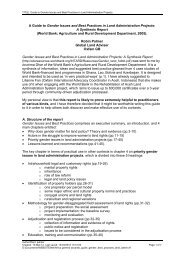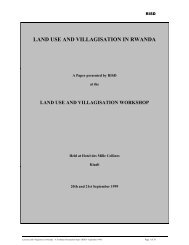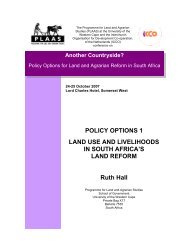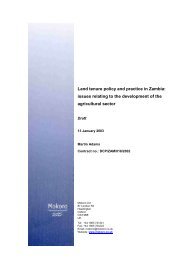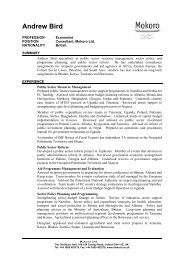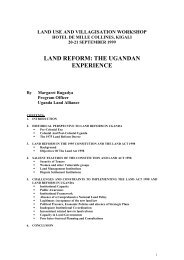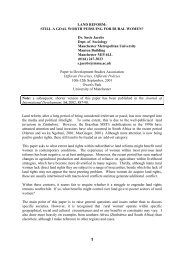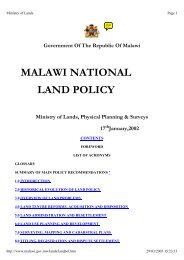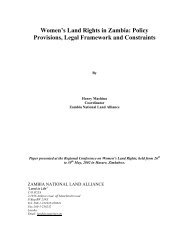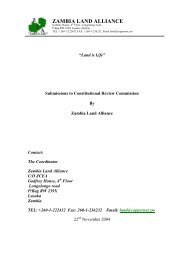The 1999 Land Act and Village Land Act - Mokoro
The 1999 Land Act and Village Land Act - Mokoro
The 1999 Land Act and Village Land Act - Mokoro
Create successful ePaper yourself
Turn your PDF publications into a flip-book with our unique Google optimized e-Paper software.
<strong>The</strong> <strong>1999</strong> <strong>L<strong>and</strong></strong> <strong>Act</strong> <strong>and</strong> <strong>Village</strong> <strong>L<strong>and</strong></strong> <strong>Act</strong> 2Presidential Commission of Inquiry, a number of commissioned studies by domestic <strong>and</strong>international experts <strong>and</strong> a National Workshop. Some controversy surrounded the adoption of thePolicy, as it ignored much of the recommendations put forward by the Presidential Commission(hereafter referred to as the <strong>L<strong>and</strong></strong> Commission). <strong>The</strong> <strong>L<strong>and</strong></strong> Commission had recommended asystem that vested rights in the users of the l<strong>and</strong> <strong>and</strong> substantially reduced the Executive’sadministrative prerogatives over the use <strong>and</strong> ownership of l<strong>and</strong>. <strong>The</strong> National <strong>L<strong>and</strong></strong> Policy, on theother h<strong>and</strong>, eschewed any effective attempt at imposing new checks <strong>and</strong> balances on executivepower. 1In 1996, the Ministry of <strong>L<strong>and</strong></strong>s hired a British consultant to draft the <strong>L<strong>and</strong></strong> <strong>Act</strong>s, with fundingfrom DfID. He faced an unenviable task in that he was strictly bound by the letter of the <strong>L<strong>and</strong></strong>Policy, with all its ambiguities <strong>and</strong> inherent contradictions. <strong>The</strong> two <strong>Act</strong>s reflect the complexityof this task. 2 <strong>The</strong>y run to a formidable 800 pages, providing detailed legislation for threecategories of l<strong>and</strong>: <strong>Village</strong> <strong>L<strong>and</strong></strong>, General <strong>L<strong>and</strong></strong> <strong>and</strong> Reserve <strong>L<strong>and</strong></strong>. On the one h<strong>and</strong>, the <strong>Act</strong>sintroduce a long overdue clarification of many of the grey areas in the large body of legislationthat it replaces. <strong>The</strong> <strong>L<strong>and</strong></strong> <strong>Act</strong> repeals no less than 10 <strong>Act</strong>s <strong>and</strong> defines in law many of theprocedures which had previously only been set down through administrative Directives. 3 On theother h<strong>and</strong>, both <strong>Act</strong>s replicates many of the fundamental problems of the system they replace.<strong>The</strong>y continue to give considerable scope for discretion <strong>and</strong> administrative directives.Robin Palmer juxtaposes two diametrically opposed interpretations of the <strong>L<strong>and</strong></strong> <strong>Act</strong>s (<strong>1999</strong>). Oneis that presented by Liz Wily, who did work on the <strong>L<strong>and</strong></strong> <strong>Act</strong>s as a consultant for DFID <strong>and</strong> theMinistry of <strong>L<strong>and</strong></strong>s. Issa Shivji, who was the Chairman of the <strong>L<strong>and</strong></strong> Commission, <strong>and</strong> who hascontinued to do analytical work relating to l<strong>and</strong>, puts the other forward. <strong>The</strong> contrasting of thesetwo scholars’ positions is instructive, particularly their respective evaluations of the <strong>Act</strong>s’treatment of the key issues of village l<strong>and</strong> <strong>and</strong> the safeguarding of customary tenure. Liz Wilycomes down heavily in favour of the new <strong>Act</strong>s, <strong>and</strong> classifies them as “basically sound”, arguingthat they are the best of their kind in Africa in terms of “vesting authority <strong>and</strong> control over l<strong>and</strong>at local level” (Palmer <strong>1999</strong>: 2). Issa Shivji, on the other h<strong>and</strong>, finds little to commend the <strong>Act</strong>s,<strong>and</strong> sees them to achieve little but to consolidate the status quo:the <strong>Act</strong>s now entrench in law what was the practice. Which is to say that the administration,management <strong>and</strong> allocation of l<strong>and</strong> are placed squarely in the Executive arm of the CentralGovernment under a centralised bureaucracy (Shivji <strong>1999</strong>: 3).That the <strong>Act</strong>s can elicit such different response is striking, but perhaps not so surprisingconsidering the considerable complexity of the <strong>Act</strong>s <strong>and</strong> some of their inherent contradictions1 For a detailed discussion of the National <strong>L<strong>and</strong></strong> Policy, see my D.Phil dissertation on the Politics of <strong>L<strong>and</strong></strong> in Tanzania(1997). I am currently preparing it for publication. Also see Shivji 1998.2 Interview with Patrick MacAuslan, conducted in 1997, after he had completed the first draft of the <strong>Act</strong>s.3 <strong>The</strong> repealed <strong>Act</strong>s are <strong>The</strong> <strong>L<strong>and</strong></strong> Ordinance, Cap 113; <strong>The</strong> <strong>L<strong>and</strong></strong> (Law of Property <strong>and</strong> Conveyancing) Ordinance, Cap114; Rights of Occupancy (Developments Conditions) <strong>Act</strong>, 1963 Cap 518; <strong>L<strong>and</strong></strong> (Settlements of Disputes) <strong>Act</strong>, 1963 Cap524; Range Development <strong>and</strong> Management <strong>Act</strong>, 1964 Cap 569; <strong>L<strong>and</strong></strong> Tenure (<strong>Village</strong> Settlements) <strong>Act</strong>, 1965 Cap 579;Rural <strong>L<strong>and</strong></strong>s (Planning <strong>and</strong> Utilization) <strong>Act</strong>, (No. 14 of 1973); Specified Coffee Estates (Acquisition <strong>and</strong> Regrant) <strong>Act</strong>,(No. 31 of 1973); Specified Sisal Estates (Acquistion <strong>and</strong> Regrant) <strong>Act</strong>, (No. 11 of 1974). It does not, however, repeal the<strong>L<strong>and</strong></strong> Registration Ordinance Cap 334, Town <strong>and</strong> Country Planning Ordinance Cap 378, or the 1967 <strong>L<strong>and</strong></strong> Acquisition<strong>Act</strong>. <strong>The</strong> <strong>Act</strong> also validates the Directive of 1988 Mwongozo Kuhusu Kubuni Michoro, Kupima na Kugawa Ardhi (MNRT1988), which establishes the <strong>L<strong>and</strong></strong> Allocation Committees, <strong>and</strong> asserts that the appointment of Committee members is atthe discretion of the Minister.




